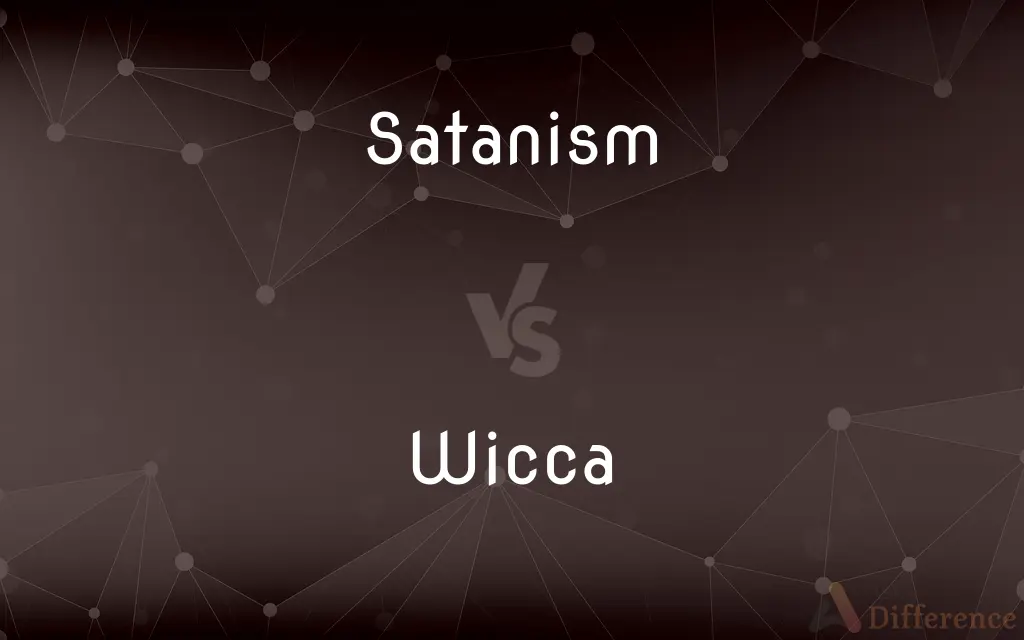Satanism vs. Wicca — What's the Difference?
By Fiza Rafique & Urooj Arif — Updated on April 17, 2024
Satanism often focuses on individualism and materialism, while Wicca emphasizes nature worship and harmlessness.

Difference Between Satanism and Wicca
Table of Contents
ADVERTISEMENT
Key Differences
Satanism, particularly as defined by the Church of Satan, centers on the celebration of the self and individualism. Wicca, on the other hand, is a religion that promotes harmony with nature and adherence to the Wiccan Rede, which advises against harming others.
Theistic Satanism involves the worship or reverence of Satan as a deity, whereas Wicca involves the veneration of the God and Goddess, alongside an intimate connection to natural elements and cycles.
Satanism advocates for personal freedom and challenges established norms and institutions. In contrast, Wicca generally supports personal and spiritual growth through more structured practices like rituals and magic that align with natural laws.
Rituals in Satanism may serve to affirm one's own power and embrace materialistic or hedonistic pleasures. Meanwhile, Wiccan rituals typically aim to bring about positive changes and honor the divine in nature.
Ethically, Satanism espouses a form of moral relativism, advocating that individuals pursue their own interpretation of right and wrong. Wicca instead follows a more defined ethical guideline, encapsulated by the phrase, “An it harm none, do what ye will.”
ADVERTISEMENT
Comparison Chart
Core Beliefs
Individualism, materialism, self-deification
Harmony with nature, duality of divinity
Deity Worship
Optional reverence to Satan as a figure
Worship of a God and Goddess
Ethical Principles
Moral relativism, individual morality
"An it harm none, do what ye will"
Ritual Focus
Affirmation of self, carnal pleasures
Celebrating natural cycles, healing, magic
Common Practices
Ritual magic, symbolic acts
Ritual magic, nature rituals, seasonal Sabbats
Compare with Definitions
Satanism
Practices often include ritualistic or ceremonial magic.
Satanists sometimes perform rituals to manifest personal desires.
Wicca
Practices include magic, typically intended to heal or help.
Wiccans might cast spells to promote healing or protect the environment.
Satanism
A religious philosophy that emphasizes physical materialism and individualism.
In Satanism, personal success and fulfillment are paramount.
Wicca
Includes a moral code known as the Wiccan Rede.
Wicca teaches adherence to the principle of harming none.
Satanism
A movement often associated with symbolic rebellion against social norms.
Satanism can represent a symbolic opposition to mainstream religious values.
Wicca
A modern pagan, witchcraft religion.
Wicca incorporates practices such as spellcasting and rituals.
Satanism
The worship or admiration of Satan, varying significantly among different groups.
Theistic Satanists literally worship Satan as a deity.
Wicca
Strongly focused on the Earth and nature.
Wiccans celebrate seasonal festivals that honor the Earth’s cycles.
Satanism
Ethically diverse, with some paths advocating egocentric philosophies.
Some branches of Satanism encourage actions based solely on personal benefit.
Wicca
Features a dualistic view of divinity, worshipping both a God and a Goddess.
Wiccan rituals often honor the divine masculine and feminine through their God and Goddess.
Satanism
Satanism is a group of ideological and philosophical beliefs based on Satan. Contemporary religious practice of Satanism began with the founding of the atheistic Church of Satan in the United States in 1966, although a few historical precedents exist.
Wicca
Wicca (English: ), also termed Pagan Witchcraft, is a modern Pagan religion. Scholars of religion categorise it as both a new religious movement and as part of the occultist stream of Western esotericism.
Satanism
The worship of Satan characterized by a travesty of the Christian rites.
Wicca
A Neopagan nature religion based in part on pre-Christian Celtic beliefs and practices, typically centering on a mother goddess or a goddess-god pair and the practice of ceremonial witchcraft.
Satanism
A body of doctrine and practice based on the celebration of individual will and explicit rejection of monotheistic notions of virtue.
Wicca
A religion derived from pre-Christian times, also called Witchcraft{4}, which practices a benevolent reverence for nature, and recognizes two deities, variously viewed as Mother & Father, Goddess & God, Female & Male, etc.; its practitioners are called Wiccans, Wiccas, or witches. Since there is no central authority to propagate dogma, the beliefs and practices of Wiccans vary significantly.
Encouraged by court rulings recognizing witchcraft as a legal religion, an increasing number of books related to the subject, and the continuing cultural concern for the environment, Wicca - as contemporary witchcraft is often called - has been growing in the United States and abroad. It is a major element in the expanding "neo-pagan" movement whose members regard nature itself as charged with divinity.
"I don't worship Satan, who I don't think exists, but I do pray to the Goddess of Creation." said Margot S. Adler, a New York correspondent for National Public Radio and a Wiccan practitioner. "Wicca is not anti-Christian or pro-Christian, it's pre-Christian."
Satanism
Satanism Profound wickedness.
Wicca
A practitioner of Wicca, also commonly called a Wiccan, Wicca, or witch .
For at least one person who has seen "The Blair Witch Project", the surprise hit movie of the summer did not so much terrify as infuriate. One long slur against witches, said Selena Fox, a witch, or Wicca, as male and female American witches prefer to call themselves.
Satanism
Alternative case form of Satanism
Satanism
The evil and malicious disposition of Satan; a diabolical spirit.
Satanism
The worship of devils (especially Satan)
Common Curiosities
What is the main philosophical base of Satanism?
Satanism is based on individualism and materialism.
Can Satanism be considered a religion?
Yes, especially in forms like LaVeyan Satanism which has structured beliefs and rituals.
What role do ethics play in Wicca?
Ethics are central in Wicca, governed by the Wiccan Rede, which instructs practitioners to avoid harming others.
How does Wicca view the afterlife?
Views on the afterlife in Wicca vary, but many believe in some form of reincarnation.
How does Wicca differ from other neo-pagan paths?
Wicca specifically incorporates a structured practice of rituals and a strong ethical code focused on harmlessness.
What is a common misconception about Wicca?
A common misconception is that Wicca is synonymous with any form of witchcraft; however, it is a distinct religion with specific beliefs and practices.
What ethical guidelines do Satanists follow?
Ethical guidelines in Satanism are individualistic and can vary widely among adherents.
Do Satanists practice magic?
Yes, some Satanists engage in ritualistic practices that may resemble magical acts.
How important are gods in Wicca?
Deity worship is central in Wicca, with practices often honoring a God and Goddess.
What is the significance of rituals in Satanism?
Rituals in Satanism are used to affirm the individual’s power and personal desires.
Is Satanism always theistic?
No, some forms like LaVeyan Satanism are atheistic, viewing Satan as a symbol rather than a deity.
What types of magic are practiced in Wicca?
Magic in Wicca typically focuses on healing, protection, and promoting positive change, aligning with natural forces.
Does Wicca involve animal sacrifice?
No, Wicca strictly adheres to the Wiccan Rede, which includes causing no harm, therefore excluding animal sacrifice.
How do Wiccans celebrate their beliefs?
Wiccans often celebrate through seasonal Sabbats and Esbats which honor the cycles of nature and lunar phases.
How do Satanists view authority?
Many Satanists are critical of external authority and uphold personal sovereignty.
Share Your Discovery

Previous Comparison
However vs. Therefore
Next Comparison
Missile vs. ProjectileAuthor Spotlight
Written by
Fiza RafiqueFiza Rafique is a skilled content writer at AskDifference.com, where she meticulously refines and enhances written pieces. Drawing from her vast editorial expertise, Fiza ensures clarity, accuracy, and precision in every article. Passionate about language, she continually seeks to elevate the quality of content for readers worldwide.
Co-written by
Urooj ArifUrooj is a skilled content writer at Ask Difference, known for her exceptional ability to simplify complex topics into engaging and informative content. With a passion for research and a flair for clear, concise writing, she consistently delivers articles that resonate with our diverse audience.
















































